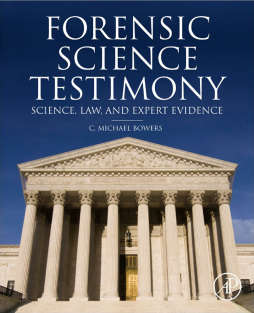
Additional Information
Book Details
Abstract
Forensic Testimony: Science, Law and Expert Evidence—favored with an Honorable Mention in Law & Legal Studies at the Association of American Publishers' 2015 PROSE Awards—provides a clear and intuitive discussion of the legal presentation of expert testimony. The book delves into the effects, processes, and battles that occur in the presentation of opinion and scientific evidence by court-accepted forensic experts. It provides a timely review of the United States Federal Rules of Evidence (FRE) regarding expert testimony, and includes a multi-disciplinary look at the strengths and weaknesses in forensic science courtroom testimony. The statutes and the effects of judicial uses (or non-use) of the FRE, Daubert, Kumho, and the 2009 NAS Report on Forensic Science are also included. The presentation expands to study case law, legal opinions, and studies on the reliability and pitfalls of forensic expertise in the US court system. This book is an essential reference for anyone preparing to give expert testimony of forensic evidence.
- Honorable Mention in the 2015 PROSE Awards in Law & Legal Studies from the Association of American Publishers
- A multi-disciplinary forensic reference examining the strengths and weaknesses of forensic science in courtroom testimony
- Focuses on forensic testimony and judicial decisions in light of the Federal Rules of Evidence, case interpretations, and the NAS report findings
- Case studies, some from the Innocence Project, assist the reader in distinguishing good testimony from bad
"…demonstrated that there was a failure of scientific rigor passed on from one generation to the next accepted by courts so that it became very difficult to over-rule earlier convictions…The book gives many examples of victims being imprisoned after being found guilty at their trial where the main evidence against them was of a forensic scientific nature."--Journal of Forensic and Legal Medicine, June 21, 2014 "This is a dense and erudite text looking at principles and practice of expert testimony applicable across a number of forensic disciplines… much of the information is relevant to any jurisdiction and for that reason alone should be requisite reading for all new forensic practitioners regardless of their discipline."--Forensics in Focus @ CSIDDS, November 12, 2013 "…it is a must read for anyone who deals with the validity (or lack of) and the power of forensic evidence and expert testimony in a trial…it emphasizes the problems with the "uniqueness principle" and the use of flawed inductive reasoning in the development of the forensic disciplines…I most highly recommend it."--The Wrongful Convictions Blog, June 19, 2014
"Forensic Testimony: Science, Law and Expert Witness Testimony by C. Michael Bowers, DDS, JD is an excellent resource for any forensic expert who is interested in or is called upon to provide testimony in a court of law. It is an invaluable guide for both newcomers and professionals alike. As a lawyer and expert witness who has testified and examined hundreds of cases, Dr. Bowers’ knowledge and insight into both arenas of the courtroom is evident. The text includes a thorough overview of what a prospective expert should be aware of regarding the legal system and how forensic evidence should be prepared for courtroom presentation. The chapters cover topics such as the admissibility of forensic expert evidence, character traits of expert witnesses, voir dire and direct examination of the expert, cross examination - the expert’s challenge and the lawyer’s strategies. The text also includes an insightful exploration into the science behind forensic science, ethics and forensic expert failures. (Mary Bush, DDS, Associate Professor, Department of Restorative Dentistry, University at Buffalo)
"The book is especially relevant to someone just beginning their journey into a forensic science discipline and is a must read for a forensic expert who has never testified before. It also is a good reminder for seasoned experts, both government and privately contracted. Science in the court room is, by its nature, different from science in a laboratory. Generally, neither jurors, judges, nor lawyers are well versed in science and assisting them in such understanding can be challenging. Forensic Testimony gives insight into some of the challenges a forensic expert will face in the courtroom including whether or not their opinion will ultimately be admitted in court, the need to be prepared to have the evidence to back up their opinions, the likely stresses of cross-examination, the need to be personable and neutral, and even guidelines on how to dress for court (Chapters 3, 5-8). Overall, this book should ease the mind of the honest forensic expert and assist in their ability to become, and continue to be, an effective expert witness." (Alissa L. Bjerkhoel, J.D., Staff Attorney at the California Innocence Project, California Western School of Law.)
